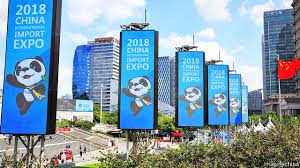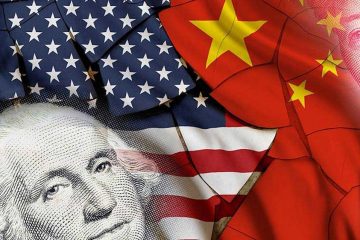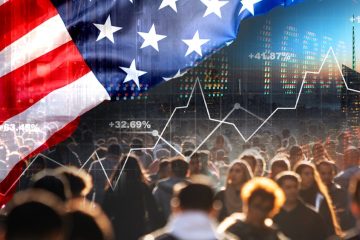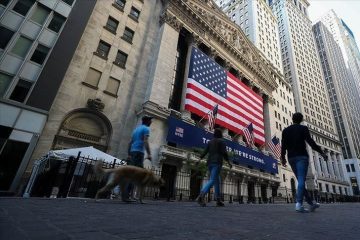China hopes a big new expo will fix its reputation for protectionism

UNDERSTANDING DONALD TRUMP’s intentions has bedevilled China since he took office. So it continued this week when the American president made comments that could signal a big escalation in the two countries’ trade war—or that a resolution is near. “I think we’ll make a great deal with China,” he told Fox News in an interview. But, he added, if talks sputter, America will impose tariffs on all goods from China. Having already hit $ 250bn-worth of annual Chinese imports with tariffs, America could target the remaining $ 267bn.
A bilateral meeting between Mr Trump and Xi Jinping, China’s president, later this month at a G20 summit in Buenos Aires should determine which outcome is more likely. First, though, Mr Xi will be pressing China’s case in the court of global opinion. On November 5th he will open a huge trade show in Shanghai designed to demonstrate to the world that China’s prosperity benefits all.
Chinese trade shows have traditionally focused on helping its exporters to attract foreign customers. The inaugural China International Import Expo will instead aim to help foreign companies entice Chinese buyers. Mr Xi, as well as innumerable Chinese officials and business leaders, will proclaim that China does not seek a trade surplus.
Yet the expo is also bound to highlight some of the tensions ratcheted up by the trade war. The main complaint of the American administration (Mr Trump apart) is not that China runs a trade surplus but that it discriminates against foreign firms, for example by pressing them to hand over technology to enter its market. Though many countries are sending official delegations and hosting national pavilions, America’s government will be conspicuous by its absence. In private, its officials say that the trade show will be little use—and that they do not want to be dragged into Chinese propaganda.
At least publicly, foreign companies are more enthusiastic. A large contingent of American bosses will show up, hoping to set their companies apart from the trade hostilities. In all some 2,800 firms will attend, from more than 130 countries. There will be big automakers (BMW, Ford and Toyota), food groups (Nestlé, Unilever and Cargill), electronics firms (Samsung, Sony and Qualcomm) and more. Since China has provided cheaper exhibition space to developing countries, alongside the multinationals will be spice merchants from Ethiopia, fruit producers from Laos and hatmakers from Ecuador.
Coverage in the Chinese media means the expo is bound to offer at the very least an excellent marketing opportunity. And some foreign firms may make worthwhile connections: the organisers estimate that more than 150,000 buyers, primarily Chinese, will attend. It would not take many Chinese deals to lift the fortunes of, say, a Sri Lankan cinnamon producer.
But privately, some bigger companies are grumbling. China’s economy long ago grew big enough that trade fairs need to target specific industries if they are not to be unwieldy, but the expo covers everything from biomedical research to furniture. Even the focus on imports is not as distinctive as billed: most Chinese trade fairs promote imports alongside exports these days. The biggest annual event, commonly known as the Canton Fair, was renamed in 2007 as the China Import and Export Fair. Firms also gripe about feeling political pressure to attend. It might not benefit you much, says one participant, but staying away would bring unwelcome attention.
There will inevitably be a flood of praise for the expo from companies eager to please China. It should be treated with caution. Firms have been asked to announce big deals during its six days. A European diplomat says the commerce ministry approached him six months ago to encourage firms from his country to re-announce recent sales agreements or bring forward future ones. The goal is to be able to trumpet a huge boost to imports at its conclusion.
Critics would forgive such publicity stunts if China also took the opportunity to tackle deeper grievances. Government advisers have said that something big will come out of Mr Xi’s speech on November 5th. Steeper tariff cuts are one possibility; tariffs on imported cars, for example, were trimmed this year to 15% but are still high by global standards. Or new protections might be announced for foreign intellectual property. Carlo D’Andrea, of the European Union Chamber of Commerce in China, says that for the expo to count as a success, it must be more than a show.
Yet the expo’s highest virtue is its symbolic value. The growth of Chinese imports is a long-term trend. In 2000 China was the world’s eighth-biggest importer, accounting for about 3% of global imports. Last year it was the second-biggest, behind only America, and its share had risen beyond 10%. For much of the past three decades the promotion of exports was central to China’s economic strategy. In promoting the expo, Mr Xi is showing that the government not only welcomes China’s transformation into an import superpower, but wants to speed it up.
This article appeared in the Finance and economics section of the print edition under the headline “Lights, camera, imports!”


